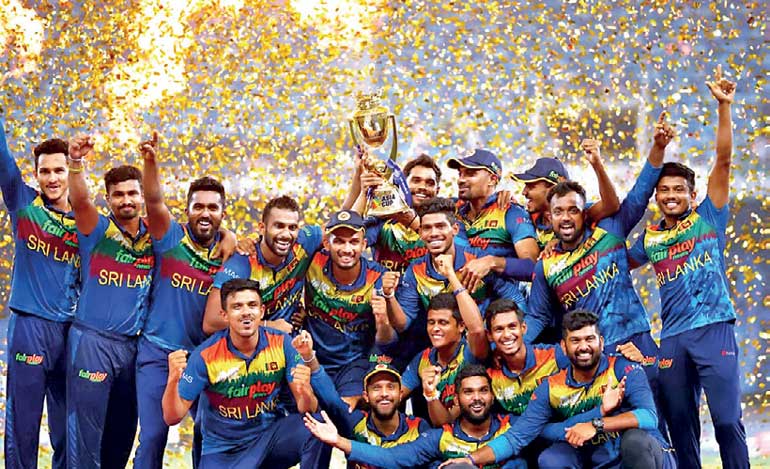Sunday Feb 22, 2026
Sunday Feb 22, 2026
Tuesday, 13 September 2022 00:36 - - {{hitsCtrl.values.hits}}

Sri Lanka celebrates their Asia Cup win against
Pakistan in final in Dubai
By Sa’adi Thawfeeq
By winning the Asia Cup has the Sri Lankan team turned the corner in T20 International cricket?
Since the 2014 ICC T20 World Cup triumph in Bangladesh, Sri Lanka’s cricket in the shortest format had declined to such an extent that they have to qualify for a place in the Super 12 of next month’s ICC T20 World Cup in Australia.
What Dasun Shanaka’s men displayed in the Asia Cup was their never-say-die attitude when placed even in the worst of situations, like when they were five down for 67 in the final against Pakistan but yet recovered to go and post a challenging total of 170 and win.
These are the virtues of a champion team, not to let the situation dictate terms to them but to have the ability to turn things around and come out victorious.
Prior to the final, Sri Lanka entered the Asia Cup merely as no-hopers than potential champions, and when they were blanked out by Afghanistan in the opening game their ranking as number eight in the world played true to form.
But what happened thereafter is history. The manner in which Sri Lanka picked themselves up from where they had fallen and improved with each and every game – beating Bangladesh in the group qualifier, and Afghanistan, India and Pakistan in the Super Four suddenly made people sit up and take notice that this was no ordinary Sri Lankan T20I side, but one that meant real business.
Here was a young side with very much less experience compared to their opponents who were suddenly making waves in the Asia Cup.
In the lead-up to the final, time and time again Sri Lanka lifted themselves and at times was dominant in their play. Yet, when it came to the final against Pakistan, people still had reservations about whether this team could go all the way and clinch the title.
They had won their last four matches batting second, and in the final when they were asked to bat first, they showed that the toss did not matter much to them to achieve what they wanted to, although it was against the run of play.
What made Sri Lanka so assertive in the Asia Cup was the belief of the players that they could always do the impossible. With that attitude, there was no stopping this team from achieving what they wanted to accomplish.
The beauty of the victory is that not one or two individuals shone for the champions, but several. At different times they put their hands up to deliver for the team. When you have a team with that kind of mindset it makes the captain’s job all the easier, for he knows that if any of his key players fail there will be someone to make up for the failure.
Shanaka has been the captain of the Sri Lanka T20I side since 2021 and initially, there were doubts cast about his captaincy as well as the role he was supposed to play in the team because he neither contributed with the bat nor he seldom bowled.
He was first appointed captain in February 2021 for the three-match T20I series in the Caribbean replacing Lasith Malinga but got off to a false start when he could not travel with the team due to a passport and visa hassle and missed the T20I series. His first T20I series after being made permanent captain was actually against India at home in July 2021 when by then, he had already been appointed the ODI captain as well succeeding Kusal Perera, soon after the tour contracts stand-off between the players and Sri Lanka Cricket.
Now after leading Sri Lanka to a historic sixth Asia Cup title, Shanaka’s place as captain of the white ball teams is well and secure. Prior to the Asia Cup, he had led Sri Lanka to a 3-2 ODI series win against Australia, a win that also had historic significance because it was achieved after 30 years.
Whilst saluting Shanaka and his men on their Asia Cup success, the question that needs to be asked is: Is this victory the turning point for the national team in T20 international cricket? It has been a long time since the T20 side had won five matches on the trot and with it, a title like the Asia Cup. What looms next for Shanaka’s team is the T20 World Cup in Australia next month which represents a different challenge altogether.
Winning the World Cup will be the icing on the cake and clear proof that the T20 team is back on track. But it is not going to be as easy as playing against five Asian nations in the subcontinent and UAE pitches that we are so familiar with.